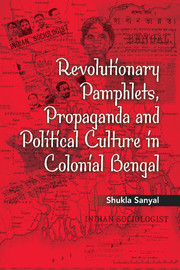Book contents
- Frontmatter
- Contents
- Preface
- Abbreviations and Glossary
- Introduction
- Chapter 1 The Origins of an Idea, 1905–18
- Chapter 2 The Signs of the Times: Constructing a Nation
- Chapter 3 Legitimizing Violence
- Chapter 4 The Battle for Domination: State Repression of Revolutionary Pamphlets
- Chapter 5 Summing Up: An Identity Forged in Battle
- Conclusion
- Bibliography
- Index
Chapter 5 - Summing Up: An Identity Forged in Battle
Published online by Cambridge University Press: 05 November 2014
- Frontmatter
- Contents
- Preface
- Abbreviations and Glossary
- Introduction
- Chapter 1 The Origins of an Idea, 1905–18
- Chapter 2 The Signs of the Times: Constructing a Nation
- Chapter 3 Legitimizing Violence
- Chapter 4 The Battle for Domination: State Repression of Revolutionary Pamphlets
- Chapter 5 Summing Up: An Identity Forged in Battle
- Conclusion
- Bibliography
- Index
Summary
The revolutionary pamphlets offer us fascinating glimpses into the narrative construction of a ‘revolutionary nationalist identity’ at the turn of the twentieth century. The revolutionaries were born and grew to manhood in a colonized world that was structured by unequal power relations between the colonizers and the colonized. The colonial environment had an immediate impact on their everyday existence by setting limits on and defining the parameters of the ways in which they could choose to lead their lives as colonial subjects. It generated powerful emotions of alienation from the colonial state and the desire to foster an identity alternate to that of the colonial subject. These emotions became embedded in the consciousness of the revolutionary nationalists and also contributed to their collective sense of self. As the earlier chapters have demonstrated, this collective sense of self involved a voluntary subscription to certain shared values and ideals that delineated the political community which the revolutionary nationalists identified with. This chapter explores aspects of this definition of self that were specific to the revolutionary nationalists. The distinctive feature of the revolutionary identity was that it was constituted in battle against the colonial rulers and drew sustenance from the shared passions of fellow revolutionaries which, in turn, bred a sense of solidarity among them. This identity also acquired legitimacy from the terms in which the conflict between the state and the brotherhood of revolutionaries was framed.
- Type
- Chapter
- Information
- Publisher: Cambridge University PressPrint publication year: 2014



